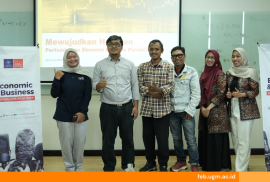Fair Value Accounting (FVA) in several posts of certain assets such as debts or loans, fixed assets and intangible assets, as well as description of non-monetary and monetary item for overseas activities, will affect the income tax (PPh). However, in the other sectors, such as for securities classified as trading and available for sale does not affect the income tax.
This is confirmed by the economist, Prof. Dr. Slamet Sugiri, MBA., Ak. In seminar “The Impact of IFRS Convergence Against the Statement of Financial Accounting Standards (PSAK) Indonesia and the Implication Against Taxation” at Kertanegara Room, FEB UGM on Saturday (3/11).
“So, it can be concluded that the FVA to specific item affects income tax, while for certain other items do not affect the income tax,” said Sugiri.
According to Sugiri, income tax is calculated based on taxable income. That is, the amount of income tax equal to the amount of income tax according to the tax regulations. Income tax expense may be greater or smaller than the income tax is calculated based on the concepts of accounting and finance.
Previously, Sugiri explained the concept of FV accounting are often opposed to the historical cost accounting (HCA). Two paradigm boils down to the value (base measurement) that is attached to the financial statement items. HCA attaches historical costs on items of financial statements. If at a certain moment the historical cost of an asset or liability differs from its FV, HCA does not change the carrying value to the FV.
“HCA does not recognize a loss or gain on the difference between the two values. While the FVA recognizes gains and losses due to market valuation that the exchange transaction is not or yet happened, “he added.
Meanwhile, Didi Raafi, SST., ME-Buss., M.Sc. (Head of Supervision and Consultation II Office of the Directorate General of Taxation Yogyakarta) accompanied Uray Hidayat, SE., M.Si. (Account Representative Office of the Directorate General of Taxation Yogyakarta) reveals characteristic of International Financial Reporting Standards (IFRS). IFRS by Didi tends to be principles-based (no longer rule based). In addition IFRS too much use of the concept of fair value (FV) for basic measurements with emphasis on size reliably.
“IFRS disclosure and are also more focused on professional judgment to conclude an accounting problem,” said Didi.
Admittedly by Didi, the effect of the convergence of IFRS does not only affect the business world, but also in the world of taxation. The differences between IFRS and taxation one of them includes fixed assets (PSAK No.16). Based on PSAKNo.16 companies are allowed to choose the method that performed periodic revaluation by the assessor with FV. Whereas in taxation regulation revaluation conducted by appraiser with FV maximum once time in 5 years.
Source: satria/ugm




